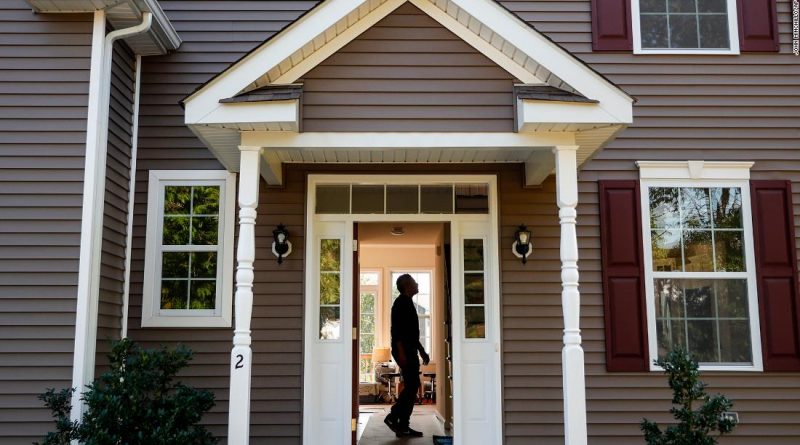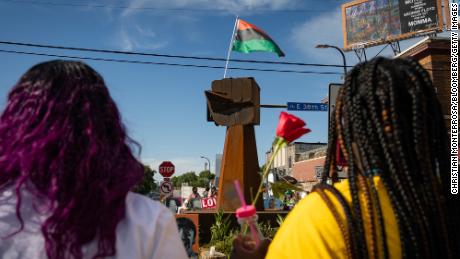Operation HOPE CEO: 'Financial literacy is the new civil rights issue'
Jonathan Reckford is CEO of Habitat for Humanity International. Lisa Rice is CEO of National Fair Housing Alliance. The opinions expressed in this commentary are their own.
It is ironic and fitting that every June, our nation recognizes both Juneteenth and homeownership, which the George W. Bush administration turned into a month-long observance. Juneteenth is the celebration of Black people’s liberation and theoretical ability to participate fully in the American Dream. Homeownership — a key driver of American household wealth — is the cornerstone of that dream. Yet today, both the Black-White and Latino-White homeownership gaps are wider than they were before the Fair Housing Act passed in 1968.
Systemic discrimination in housing and lending policies has been a prime engine of social and economic inequality among communities of color. Black households own about 2.9% of wealth in the US, only slightly more than they owned in 1863 when the Emancipation Proclamation was signed into law. For perspective, the median White household today has about $188,000 in wealth, compared to $24,100 and $36,100 for Black and Latino families, respectively. Without interventions, researchers project that by 2053, the median wealth for Black households will fall to $0, and by 2073, median Latino wealth will meet the same fate.
Elected officials and affordable housing advocates must do more than just talk about the imperative for fair housing reforms. They must act boldly and decisively to ensure the dream of American homeownership does not remain an empty promise for yet another generation of Black and Latino families.
By implementing the following policies and programs, we can finally break our nation’s legacy of housing discrimination, and all Americans — of every race and origin — will reap the benefits.
Revitalize distressed neighborhoods
In the 1930s, the Home Owners’ Loan Corporation institutionalized redlining, where largely non-White neighborhoods were marked as undesirable and shaded in red to warn off potential lenders. Meanwhile, mostly affluent White neighborhoods were considered the most desirable and creditworthy.
Federal, state and local policymakers must now work to fix the opportunity cost of decades of redlining and discrimination on communities now struggling to build back from disinvestment and economic distress. As communities are developed, policies must ensure residents have continued access to affordable and sustainable rental and homeownership opportunities.
A critical first step is ensuring the passage of the Neighborhood Homes Investment Act, which is languishing in Congress. The bill would offer tax credits to drive reinvestment and rehabilitation of affordable homes in distressed neighborhoods, which would, in turn, increase home values and help build intergenerational wealth among households of color. It’s estimated that this investment would create more than $1.25 billion in federal, state and local tax revenues.
Implement zoning reforms
Though the Supreme Court outlawed explicit racial zoning in 1917, it didn’t ban the practice of exclusionary zoning, which effectively segregated neighborhoods by race and wealth. It was designed to keep lower-wealth households and people of color out of middle-class, predominately White neighborhoods.
Today, policies such as exclusionary zoning are reinforcing segregation as well as driving concentrated poverty zones in communities across America. Restrictive land use and zoning laws limit the expansion of our nation’s affordable housing supply and prevent millions of Black, Latino, Asian and Native people from accessing quality jobs, good health care, education, and safe and clean neighborhoods. It’s time Congress, state and local governments work to dismantle these discriminatory practices.
Research from Citi reveals that eliminating critical disparities, in things like housing and wages, for Black people alone would add $5 trillion to the US GDP over a five-year period. Government, corporate and civic leaders must support the development of mixed-income, mixed-use communities, which attract all income levels and simultaneously serve residential, commercial and civic purposes. They lead to greater upward mobility, but also stronger long-term health and economic outcomes for all residents.
Work to change mindsets
In its early decades, the Federal Housing Administration (FHA) helped countless White families attain financial security by granting them sustainable and affordable home mortgage loans, and yet just 2% of FHA-backed loans went to home buyers of color. During this time when housing was much more affordable, the FHA also championed suburban subdivision construction and the use of restrictive racial covenants, which banned the sale of millions of homes to all but White families.
Advancing Black homeownership and closing the racial wealth gap require more than passing seminal housing reforms. They demand a fundamental change in our collective national mindset. Affordable housing leaders, local fair housing organizations and national nonprofits have a critical role to play in uprooting racialized bias in the housing market, which consistently underprices homes in Black neighborhoods, and perpetuates unfair mortgage, lending, credit and tax assessments.
Equity-based initiatives, such as first generation down payment assistance, which expands credit to first-generation homebuyers, and special purpose credit programs, which help lenders and nonprofits tailor lending programs to specifically meet the needs of economically disadvantaged consumers, are vital for opening doors to housing and credit access for underserved groups.
Fair housing groups in different communities are launching WIMBY (Welcome in My Backyard) campaigns, challenging individual residents to take pledges declaring that they welcome everyone into their neighborhood. And nationwide, Habitat for Humanity affiliates are working hard on a new initiative to increase Black homeownership and advocacy efforts to expand affordable housing, revitalize distressed neighborhoods and develop mixed-used communities.
Fair and affordable housing is not a luxury. It is a basic human right and a vital gateway to greater health, education and economic well-being. As we celebrate Juneteenth and the American Dream of homeownership, we must come together as a nation to pave a new way forward — one that is cemented in the long-overdue promise of housing equity and justice for all.
Source: Read Full Article



